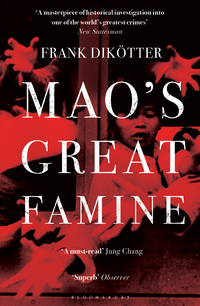The Taipei Times, 12 September 2010
One Leap Forward, Two Leaps Back
Frank Dikotter lifts the lid on the horrors of Mao Zedong’s disastrous Great Leap Forward
Last week saw the UK publication of Frank Dikotter’s Mao’s Great Famine. It was a significant event, notably in relation to the author’s positioning of himself as a modern historian of China. Up until now he’s written largely about the republican era (1912-1949), and has become a major authority on the period. Here, though, he launches himself into the communist era, a period that already boasts many experts.
It’s arguable, however, that this new work is also a different kind of book. Whereas his earlier publications were essentially unexpected and eclectic, fireworks that sought to challenge traditional perceptions, this new book is comprehensive, wide-ranging and almost magisterial in tone. It’s also highly readable. It’s as if in launching himself into this new era the writer has taken the opportunity to become something he wasn’t before — a narrative historian covering a large field who will appeal to non-specialists as well as to fellow experts. Dikotter is on the way to becoming a sort of A.J.P. Taylor of modern Chinese history.
This is not to say the book isn’t thoroughly researched. The scope of its research is actually one of its major achievements, basing its picture on the author’s work in provincial archives only recently opened to scholars. He’s also studied in archives in the former Soviet Union and East Germany, two countries closely involved with China at the time. The intelligence bulletins of Taiwan’s secret services from the same period, now held at the Bureau of Investigation in Sindian, Taipei County, are praised for their insight, though Dikotter opts not to rely on them.
Dikotter’s general position is already a familiar one in our market-oriented age. To him, command economies are all recipes for disaster. Once grandiose schemes are handed down from above, all the myriad interactions that constitute traditional societies fly out of the window. There are a couple of passages in this book where the old China that was still ticking away in the republican era is evoked with an unmistakable nostalgia. Every human need was catered for because of the instinct for survival of the poor. Nothing was wasted, every hectare was cultivated to its maximum potential, trade flourished in every nook and cranny, and beneficial activities, resulting from the satisfaction of human needs for profit, took place on every hand.
With state planning, however, a terrible change took place. A formerly pious people began to cheat, lie, steal, fight among themselves, and sometimes, through no fault of their own, even become witting or unwitting cannibals.
The author never says so bluntly, but the implication of his portrayal is that human nature itself was denied by these Marxist theoreticians, and the result was inefficiency on a massive scale, producing waste, misery, destruction and eventually death. Dikotter tentatively supports estimates that between 1958 and 1962 some 50 million Chinese died of starvation and its related ills, making China’s famine nearly as great a killer as World War II.
The immediate cause was Mao Zedong’s (毛澤東) Great Leap Forward because it involved massive exports of foodstuffs to subsidize unrealistic economic goals. Vast enterprises such as dams and hastily thought-up industrial projects had to be paid for by foreign loans, and the state’s pride and production targets took precedence over the actual welfare of the people. Cadres had to choose between succoring the peasants and satisfying their superiors with lies about what was happening on the ground, and most opted for the latter.
There’s a relentlessness about this book’s portrayal of disaster and mis-management that at times recalls Jung Chang and Jon Halliday’s Mao: The Unknown Story (2005). That book failed to convince this reviewer because of its blanket condemnation of its subject. Dikotter is far more credible as a historian, however, noting for instance that epidemics failed to materialize in the wake of starvation, and crediting the Communist Party with taking efficient measures to isolate incidences as soon as they occurred. Such credit given to an organization he elsewhere sees as responsible for one of the greatest disasters in human history is a sure mark of an objective and fair-minded intelligence. The conclusion, therefore, has to be that this account makes such depressing reading because events really were that terrible.
Even so, this is not a book to look to for gruesome horror stories. Instead, Dikotter casts his net widely and describes a whole society, looking in separate chapters at women, the elderly, acts of resistance, violence against perceived rebels, foreign relations, and much more. It’s not so much the story of a famine as a depiction of a would-be utopia 10 years after its inauguration, a society already showing multiple signs of being on the verge of catastrophe. Such planned-from-the-top societies, Dikotter is implicitly saying, will simply never work.
But even 50 million dead didn’t convince the authorities in Beijing, and the people of China had to undergo another appalling convulsion in the shape of Mao’s Cultural Revolution before the inevitable change of track took place. What’s extraordinary is how quickly the benefits of that change have become apparent.
One of the problems with anti-communism is the company you find yourself in — greedy investors, media moguls and evangelical zealots, among others. But Dikotter is surely a man who has no illusions about the shortcomings of unbridled capitalism either. What would be interesting would be to read something from his pen about China today. But he must be too exhausted now to do anything other than breathe a sigh of relief that his recent massive labors are over.
This is a magnificent book that will set new scholarly standards and probably reach a wide readership at the same time. One of Mao’s sayings is used as a grimly ironic epigraph. “Revolution is not a dinner party,” it reads.

